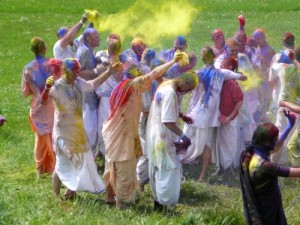 Did you know that this is the time of the year when people of Indian descent celebrate an ancient festival of spring called “Holi” or “Phagwah”, that includes peacemaking? Everyone gets what can best be described as colored baby powder – red, green, blue, etc. – and they sprinkle it on people with whom they’ve had a conflict. Here’s how Karna Singh, with the Rakjumari Cultural Center in Queens, NY, describes it to Pulse of the Planet:
Did you know that this is the time of the year when people of Indian descent celebrate an ancient festival of spring called “Holi” or “Phagwah”, that includes peacemaking? Everyone gets what can best be described as colored baby powder – red, green, blue, etc. – and they sprinkle it on people with whom they’ve had a conflict. Here’s how Karna Singh, with the Rakjumari Cultural Center in Queens, NY, describes it to Pulse of the Planet:
“It’s a time when people try to heal any difference or disagreement or conflict that existed from the past on this day. And the fun about it is that the way you do it is, not by even discussing the problem, but just marching straight up to your brother who you quarreled with, or mother who you were angry with, and take that colored powder and spray them, or rub it onto them, and hug them and kiss them.”
Will this really make peace? It won’t help with deep sins like adultery or abuse, but it just might have its place. Perhaps you realize you said something to someone that came across as more critical or angry than you intended; or you belatedly discovered that you missed a friend’s birthday or special occasion; or you neglected to return a phonecall. Rather than go through the awkward steps of apologizing, you can just walk up to them and throw some colored powder on them. They’ll presumably know what you mean. It’s a way to make peace without making peace. It’s better than nothing! Of course it’s not as beneficial as going through the true confession-forgiveness process—but for those conflicts where we were probably not going to do that anyway, this at least puts a peaceful veneer on the relationship.
Do some people throw colored powder on each other, year after year?
It strikes me that our Western Christian culture lacks a peacemaking ritual. Jews have their High Holy Days, and the Amish have their annual pre-communion time, but mainstream Christianity lacks an annual reminder of the need for peacemaking. Columnist Ann Landers has tried to fill this void with “Reconciliation Day” on April 2: “Since 1989, I have suggested that April 2 be set aside to write that letter or make that phone call and mend a broken relationship. Life is too short to hold grudges. To forgive can be enormously life-enhancing. . . .” A Catholic group is promoting October 4, the feast day of St. Francis of Assisi, as Reconciliation Day: “Reconciliation Day’s large purpose is to contribute to the resolution of conflicts and to promote reconciliation and peaceful, even joyful, coexistence.” (http://reconciliationday.net/RECONCILIATION_DAY_STORY.html)
From a New Testament perspective, every day should be “Reconciliation Day.” Jesus taught that, if while you are worshiping you remember that someone is upset with you, you should leave worship and go reconcile with that person (Matthew 5:7). We don’t get to postpone it. But the reality is that we do keep postponing it, and an annual cultural ritual might be just what we need to initiate peacemaking. Where can I get some of that baby powder?
